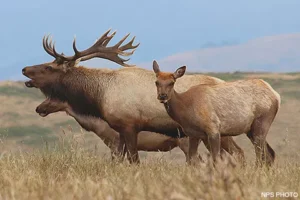
CALIFORNIA (SFGate) – Tule elk are once again roaming the Sierra Nevada foothills southwest of Sequoia and Kings Canyon National Parks after a historic land return that Gov. Gavin Newsom is calling the largest of its kind in the region’s history.
The 17,030 acres made up of two former ranch properties were recently returned to the Tule River Indian Tribe, the California Natural Resources Agency announced on Wednesday. The tribe’s ancestral lands straddle the foothills of present-day Tulare County.
The deal marks the largest of its kind in the Central Valley, Newsom’s office wrote in a news release.
“The historical wrongs committed by the state against the Native people of this land echo through the natural worlds of California — ecosystems that lost their first and best stewards,” Newsom was quoted in the release. “Today marks a critical step in deepening the relationship between the state and the Tule River Indian Tribe, and works towards restoring the deep relationship between the Tribe and their ancestral lands.”

The land return was funded through the California Natural Resources Agency’s Tribal Nature-Based Solutions program, which partners with tribes across the state to place the stewardship of ancestral land back in indigenous hands. A similar land return took place as part of the program in August, when over 1,000 acres of land in San Diego County was returned to the Iipay Nation of Santa Ysabel.
The land that was returned to the Tule River Tribe, known as Yowlumne Hills, now acts as a connection between the tribe’s existing reservation and large swaths of U.S. Forest Service land, including the Giant Sequoia National Monument within Sequoia National Forest.
“Now these new 17,000 acres are connecting all of that, so all of the species that are relying on the landscape now have a full corridor that is going to be protected in perpetuity,” Geneva E. B. Thompson, deputy secretary for tribal affairs at the California Natural Resources Agency, told SFGATE by phone.
Among these species is the Tule elk, an elk that’s endemic to California but hadn’t been seen in the Sierra foothills for decades — until this week, when a group of tribal members and supporters gathered to celebrate the return of the land and release several of the animals so they can populate the area once more.
The tribe partnered with the California Department of Fish and Wildlife to reintroduce the elk, which were brought to the property from an elk reserve managed by the agency, Thompson said.
“The tribe is very invested in doing a lot of these kind of key species reintroduction, not only for their members, but also for the health and wellbeing of the ecosystem,” Thompson said. The tribe also reintroduced beavers to the South Fork Tule River last year.
Forestry work and wildfire prevention are included in future management plans for the land, Thompson said. This would involve cleaning up debris from past wildfires and reintroducing cultural prescribed burns to the landscape.
“This will ensure that if and when another forest fire happens, their lands are under their management, and are going to be resilient and can better respond to those conditions,” Thompson said.
Management plans will also include the continued protection of the Deer Creek watershed, which is one of the last remaining undammed waterways in the southern Sierra Nevada, according to the agency.
“This land return demonstrates the very essence of tribal land restoration, which expands access to essential food and medicinal resources. It also supports the ongoing preservation of cultural sites, deepens environmental stewardship, and restores wildlife reintroduction efforts,” Tule River Tribal Council Chairman Lester R. Nieto Jr. said in CNRA’s release. “The Tribe envisions this land located in the Yowlumne Hills as a place to gather, heal, and simply be, for members of the Tule River Indian Tribe.”
This story originally appeared on SFGate.com. Writen by Sam Mauhay-Moore, National Parks Reporter
More Local News




